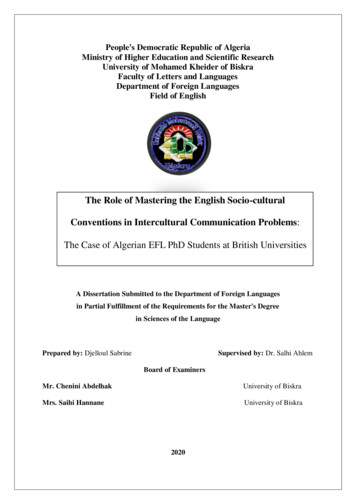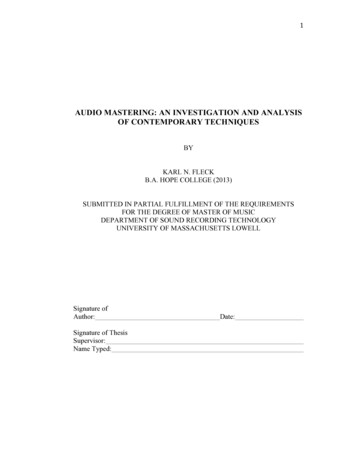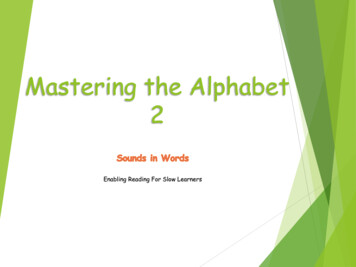
Transcription
People’s Democratic Republic of AlgeriaMinistry of Higher Education and Scientific ResearchUniversity of Mohamed Kheider of BiskraFaculty of Letters and LanguagesDepartment of Foreign LanguagesField of EnglishThe Role of Mastering the English Socio-culturalConventions in Intercultural Communication Problems:The Case of Algerian EFL PhD Students at British UniversitiesA Dissertation Submitted to the Department of Foreign Languagesin Partial Fulfillment of the Requirements for the Master's Degreein Sciences of the LanguagePrepared by: Djelloul SabrineSupervised by: Dr. Salhi AhlemBoard of ExaminersMr. Chenini AbdelhakUniversity of BiskraMrs. Saihi HannaneUniversity of Biskra2020
IIDedicationI dedicate this work to:My precious parents whom without them i would not have been able tocreate this workMy siblings who encouraged me with their support through this whole yearMy dear colleagues who helped me and reached out my help as well
IIIAcknowledgementsFirst of all, all praise is to Allah, the one who granted me with his great favors and blessings,and who guided me and gave me strength to finish this work.A deep sense of gratitude goes to my supervisor Dr. Ahlem Salhi for her valuable assistance,her beneficial guidance, her constant support and her patience with me despite all herengagements.I would also like to thank the members of the Board of Examiners: Mr. Chenini Abdelhakand Mrs. Saihi Hannane for reading and evaluating my dissertation.I am also thankful for all the English devision teachers at Biskra university who tought methrough the whole five years of universityI would like to express my sincere appreciation to Algerian EFL PhD students at Britishuniversities for their acceptance to be cooperative.A Special gratitude is given to Mr. Douida Brahim whom without his help I would not havebeen able to make this work.I should not forget to offer my special thanks for my classmates Nour El Houda, Oumaima,Dalila, Rayane and all those who helped me through the whole five years at university.
IVAbstractThe English culture has always been inseparable from its language, yet most of EFL classesdo not tend to teach its culture as deeply and thoroughly as it should be. The Algerian EFLsystem, for instance, is mainly based on teaching grammatical rules and structures of thelanguage to be memorized more than of the socio-cultural contexts and situations to bepracticed. Consequently, most of Algerian EFL students do not have high languageproficiency levels especially the ones who decide to finish their study abroad. In thisresearch’s case, the Algerian EFL PhD students who went to British universities are the mainpopulation of the study. Through this work, we will seek to uncover the role of mastering theEnglish socio-cultural conventions in intercultural communications, so it was hypothesizedthat if teachers raise EFL students’ awareness about cultural conventions, cross-culturalcommunication problems will be reduced. Accordingly, a questionnaire was submitted totwenty students and revealed that although the international experience had a positive impacton the Algerian student’s levels of the language, they faced many socio-cultural difficulties.Hence, the Algerian educational system must be enhanced, and EFL teachers must worktogether with students to achieve better results. Eventually, it was suggested that culturalexchanging programs and adjusting the Algerian EFL curriculum would be very beneficial toreduce this problem.
VList of AbbreviationsAWEJ: Arab World English JournalDMIS: Developmental Model of Intercultural SensitivityEFL: English as a Foreign LanguageIC: Intercultural competenceICC: intercultural communicative competenceTEFL: Teaching English as a foreign Language
VIList of TablesTable 1.1: Oral expression syllabus . Error! Bookmark not defined.Table 3.1: Students' levels in English before studying abroad. 42Table 3.2: Students levels in English after studying abroad . Error! Bookmark not defined.Table 3.3: Students' difficulties while studying abroad . Error! Bookmark not defined.Table 3.4:Reasons of facing difficulties when studying abroadError!Bookmarknotdefined.Table 3.5: Students' attitude towards the Algerian EFL teaching systemError!Bookmarknot defined.Table 3.6: Students' socio-cultural background of English language before going abroad. Error! Bookmark not defined.Table 3.7 : The effect of the cultural background of English language on languageproficiency and intercultural communication skills . Error! Bookmark not defined.Table 3.8: Students' opinions on teaching the English socio-cultural conventions andgrammar rules in the Algerian EFL curriculum equally . Error! Bookmark not defined.Table 3.9: The role of the exposure to the socio-cultural conventions of English . Error!Bookmark not defined.Table 3.10: Students' reasons behind the role of the exposure to the socio-culturalconventions of English . Error! Bookmark not defined.Table 3.11: Students' knowledge about intercultural competenceError!Bookmarknotdefined.Table 3.12: Type of intercultural problem encountered abroadError!defined.Bookmarknot
VIITable 3.13: Frequency of facing intercultural communicative problemsError!Bookmarknot defined.Table 3.14: The Algerian teacher's awareness of the intercultural competence teachingmodels . Error! Bookmark not defined.Table 3.15: Studying about the intercultural competence in AlgeriaError!Bookmarknotdefined.List of FiguresFigure 2.1 : The cultural iceberg . Error! Bookmark not defined.Figure 2.2 : Byram's model of ICC . Error! Bookmark not defined.Figure 2.3 : Bennett's DMIS model . 33Figure 3.1 : Students' levels in the English languaga before going abroad . 42Figure 3.2 : Students' levels in English after Studying abroad Error! Bookmark not defined.Figure 3.3 :Students' difficulties encountered while studying abroadError! Bookmark notdefined.Figure 3.4 : Reasons of facing difficulties when studying abroadError!Bookmarknotdefined.Figure 3.5: Students’ attitude towards the Algerian EFL teaching systemError!Bookmarknot defined.Figure 3.6 : Students' socio-cultural background of the English language before going abroad. Error! Bookmark not defined.
VIIIFigure 3.7 : The effect of the cultural background of English language on laguage proficiencyand intercultural communication skills. Error! Bookmark not defined.Figure 3.8 Students' opinions on teaching the English socio-cultural conventions andgrammar rules in the Algerial EFL curriculum equally . Error! Bookmark not defined.Figure 3.9 :The role of the exposure to the socio-cultural conventions of English . Error!Bookmark not defined.Figure 3.10 : Students' reasons behind the role of the exposure to the socio-culturalconventions of English . Error! Bookmark not defined.Figure 3.11 : Students' knowledge about intercultural competenceError!Bookmarknotdefined.Figure 3.12 : Type of intercultural problem encountered abroadError!Bookmarknotdefined.Figure 3.13 : Frequency of facing intercultural communicative prolemsError!Bookmarknot defined.Figure 3.14 : The Algerian teachers' awareness of the intercultural competence teachingmodels . Error! Bookmark not defined.Figure 3.15 : Studying about the intercultural competence in AlgeriaError! Bookmark notdefined.Table of ContentDedication . IIAcknowledgements . IIIAbstract . IV
IXList of Abbreviations . VList of Tables . VIList of Figures . VIGeneral IntroductionIntroduction .11.Statement of The Problem .12.Objective of The Research .23.Research Questions.24.Research Hypothesis .25.Research Significance .26.Research Methodology and Design .26.1.Population and Sample .36.2 Data Collection and Analysis Procedures. .37.Structure of the Research .3Chapter One: Introducing Socio-cultural Conventions to EFL StudentsIntroduction .51.1. Definitions of Socio-cultural Conventions .51.2. Society and Culture.61.2.1. What is Society ? .61.2.2. The Difference Between Society and Community .81.2.3. What is Culture ? .81.2.4. The Big ‘C’ and Small ‘c’ Culture .9
X1.2.5. Characteristics of Culture . 1001.3. Language Conventions. 1211.3.1. What is Language ?. 1321.3.2. The relationship between language and the socio-cultural conventions . 1431.3.3. The development of language along with socio-cultural conventions. 1441.4. Teaching Socio-cultural Conventions in EFL Classes . 1541.4.1. Historical Background of Teaching Socio-cultural Conventions in EFL Classes. 1651.4.2. Development of Teaching Socio-cultural Conventions in EFL Classes . 1661.4.3. Facilities to expose socio-cultural conventions to EFL Classes . 1771.4.3.1. Authentic Materials . 1871.4.3.2. Role Plays . 191.4.3.3. Oral Expression Sessions . 2001.5. The importance of exposing socio-cultural conventions to EFL students . 222Conclusion . 233Chapter Two: The Role of ICC in Global CommunicationsIntroduction . 25Intercultural Competence : Definitions and components . 25Intercultural Communicative Competence . 282.2.1.Acquiring Intercultural Communicative Competence . 302.2.2. Byram’s Model of ICC in EFL teaching .312.2.3. ICC and International Students . 322.2.3.1. Ethnocentrism .34
XI2.2.3.2. Culture Shock .352.2.3.3. Bicultural Identity : . 362.2.4. Assessment of ICC.37Conclusion . 390Chapter Three: Reseach Findings and Data AnalysisIntoduction . 413.1. The Questionnaire .413.1.1. The Aim of the Questionnaire . 413.1.2. Population and Sampling . 413.1.3. Description of the Questionnaire . 423.2. Students’ Questionnaire Analysis . 423.2.1. Section One: The English Culture and Socio-cultural Conventions . 423.2.2. The Role of Intercultural Competence in Intercultural Communications .563.3. Discussion of the Results .63Conclusion . 63Recommandations and Implications .64General Conclusion . 64Limitations of the Study and Suggestions for Future Research . 69Rreferences . 72Appendices . 82A Questionnaire for Algerian EFL PhD Students at British Universities . 83
XII . 82 الملخص
1General IntroductionIntroductionIn this research, we will discuss two notions independently: interculturalcommunication and socio-cultural conventions. While The former is related to when two ormore people from totally different cultures encounter in a conversational situation andeventually face certain obstacles, The latter is all about the norms of a certain language ( inthis case, English) that govern its society and shape its identity from other societies. To abetter understanding, we will discuss the role of mastering the Socio-cultural conventions ofEnglish in intercultural communications in more depth.1. Statement of the ProblemThe English language has been a target language in EFL classes of Algeria for a longtime. It has been nearly taught in the same way at all universities and colleges, that isfocusing more on the grammatical and syntactic rules of the language and instructing studentsto learn them by heart. This methodology of teaching and learning English at all the Algerianeducational institutions seemed to be quite satisfactory as long as students are not willing tofinish their studies abroad. But if this is not the case, students will face many problems at thetarget language countries which they did not even know they will be facing.The main common problem is in the cross-cultural communication phenomenonwhere students will not be able to understand the social and cultural background of Englishleading to an interactional breakdown between international students and local citizens. Thishuge gap in communication makes us notice that the Algerian educational system has beenhaving a missing piece in its teaching methods for all these past decades. It was dealing withthe social and cultural conventions of English to make the students dive into, understand, andinteract smoothly with the real everyday language in American or English societies. As a
2result, language grammar and socio-cultural conventions are two inseparable entities.Therefore, language learning is at once a socio-cultural learning.2. Objective of the ResearchThis research is aiming to investigate the role of mastering the socio-culturalconventions of English in intercultural communications. The objective is to reduce crosscultural communication problems which face many Algerian students in British countrieswhen trying to interact internationally as well as interculturally.3. Research QuestionsThis study aims to answer the following questions:1. Would mastering the socio-cultural background of the language help in reducing crosscultural communication problems?2. Can EFL students communicate interculturally if they have either a grammaticalbackground or a socio-cultural background of the language only?3. Are grammar and language conventions both essential in mastering any languageentirely?4. Research HypothesisIt is hypothesized that if teachers raise EFL students’ awareness about culturalconventions, cross-cultural communication problems will be reduced.5. Research SignificanceThe value of this research is to help Biskra university EFL students at the Englishdepartment reach to an advanced level of English with fluent, accurate, and sophisticatedmastery of the language that enables them to internationally interact and communicate.6. Research Methodology and DesignIn this research, we are aiming to undertake a descriptive research design through acase study approach in which we will seek to uncover the role of mastering the socio-cultural
3conventions in cross-cultural communications of EFL students at British universities bothquantitatively and qualitatively speaking.6.1. Population and sampleIn this research, the population is all Algerian EFL PhD students at Britishuniversities, and the sample is represented in 20 Algerian EFL PhD students at Britishuniversities through a random sampling procedure.6.2. Data Collection and Analysis ProceduresA semi-structured questionnaire will be put online to a group of Algerian EFL PhD studentswho study at British universities. The analysis procedures will be descriptively andstatistically displayed via charts and discourses7. Structure of the DissertationThe first chapter will descriptively discuss the socio-cultural conventions of theEnglish language and its importance in avoiding communicating problems. The secondchapter will discuss the problems of intercultural communications that face many AlgerianEFL PhD students when they engage in conversations with British citizens abroad. The thirdchapter will be practical through which it will analyze the EFL PhD learners’ questionnaire.
Chapter One: Introducing the Socio-cultural Conventions to EFL StudentsIntroduction1.1. Definitions of Socio-cultural Conventions1.2. Society and Culture1.2.1. What is Society?1.2.2. The Difference between Society and Community1.2.3. What is Culture?1.2.4. The Big “C” and Small “c” culture1.2.5. Characteristics of Culture1.3 Language Conventions1.3.1. What is Language?1.3.2. The Relationship between Language and the Socio-cultural Conventions1.3.3. The Development of Language along with Socio-cultural Conventions1.4. Teaching Socio-cultural Conventions on EFL Classes1.4.1. Historical Background of Teaching Socio-cultural Conventions in EFL Classes1.4.2. Development of Teaching socio-cultural Conventions in EFL Classes1.4.3. Facilities to Expose Socio-cultural Conventions to EFL Students1.4.3.1. Authentic Materials1.4.3.2. Role Plays1.4.3.3. Oral Expression Sessions1.5. The Importance of Exposing Socio-cultural Conventions to EFL StudentsConclusion
5Chapter One : Introducing Socio-cultural Conventions to EFL StudentsIntroductionFor a correct and appropriate language use, the notion of the socio-cultural conventionsof any language is as important as its grammar rules or even more. Nevertheless, theseconventions were neither taught nor applied as they should be in the previous or recentAlgerian educational curricula, so it is highly likely to reconsider exposing them to EFLlearners through various methods in order to achieve a better understanding of the Englishlanguage as well as being able to gain cultural awareness, adapt with cultural differences, andconfidently interact within intercultural environments. After all, this is the core of teachingand learning languages in EFL classes. In this chapter, definitions of the socio-culturalconventions, culture, and society will be displayed as well as their relation to language. Inaddition, the researcher will discuss the historical background, developmental changes, andimportance of exposing them to EFL classes by giving techniques to facilitate the process ofteaching and learning these language norms in the most affective possible way.1.1. Definitions of Socio-cultural ConventionsThe shared and generally accepted rules, traditions, customs, criteria, standards, andnorms of a group of people in a certain society is called socio-cultural conventions. Thissimple definition is more explained by Rescola (2007) when he stated that in a social context,a convention may retain the character of an "unwritten law" of custom (for example, themanner in which people greet each other, such as by shaking each other's hands). Certaintypes of rules or customs may become law and regulatory legislation may be introduced toformalize or enforce the convention (for example, laws that define on which side ofthe road vehicles must be driven).
5Chapter One : Introducing Socio-cultural Conventions to EFL StudentsAnother definitions was stated by Lewis (1969, p. 19) in which he talked about thecomplexity and depth of the social convention concept although they appear simple, known,and generalized by its community members. He declared the following statement:A social convention is a regularity widely observed by some group of agents.But not every regularity is a convention. We all eat, sleep, and breathe, yetthese are not conventions. In contrast, the fact that everyone in the UnitedStates the United States drives on the right side of the road rather than theleft is a convention. We also abide by conventions of etiquette, dress, eating,and so on.When diving deeply into the meaning and history of the word "convention" itself, wefind when Rescola (2007) mentioned that conventions arise and stay the same for a very longperiod of time because all of its people, their ancestors, and descendants share their explicitagreements, such as promises or contracts. This definition was adopted from ThomasHobbes’s theory of government (1997) as resulting from a social contract.After the notion of the "explicit agreement of the conventions", A contradicted notionthat is called ‘tacit agreement’ was introduced by John Locke. He claimed that there is nosuch thing as an explicit agreement within an ouvert convening because it does not make anysense of understanding. He said "What language would participants in such an agreementemploy when conducting their deliberations? We can hardly call a cow a cow and a wolf awolf" (as cited in Rescola 2007, p. 01).An example of the different socio-cultural conventions that distinguish a society fromanother will be illustrated in a comparison between the English and Chinese societies whentaking pictures. Edwards (2016) assures that in the old centuries of England, smiling in
6Chapter One : Introducing Socio-cultural Conventions to EFL Studentspictures was never occurring because they thought that a photograph was a frozenpresentation of a person. On the other hand, the Chinese conventions were extreamly theopposite because they tended to smile from the beginnings of camera inventions. It was apurely natural socio-cultural convention which could not be changed or manipulated easily.We can say that the socio-cultural conventions of any society are Conventions are theunspoken, unofficial rules within a particular community that are accepted and followed bymembers who may not even be aware of them. They are inherited naturally since birth and arepassed through generations. Also, it is very hard to change them because they take a long timeto change due to their complex and innate nature which comes within native languageacquisition itself and the surrounding environment. For example, if you drink a soda, youprobably live in a different geographical region of the United States from someone whodrinks pop. And if you drink a coke, you live in yet another region. All three words refer tothe same thing, a sugary, carbonated drink, but users are influenced in their word choice bythe preference of their community ( Amberg &Vause, 2010).1.2. Society and CultureIn the process of investigating the terminology "socio-cultural", it may appearsignificantly complicated to be understood. However, if we attempt to disintegrate it intounits, we will discover that it is composed of two meaningful as well as independent words:society and culture. In this section, the researcher will provide some concepts to a betterunderstanding of these two separate yet interrelated notions.1.2.1. What is Society?"The term "society" which came from the Latin word societas generally designatespersons belonging to a specific in-group. In anthropology, the term is used to refer not only to
7Chapter One : Introducing Socio-cultural Conventions to EFL Studentsa group of people but also to the complex pattern of the norms of interaction that arise amongthem" (Concept of society, n.d.). This definition reassures the strong bond between societyand norms of interaction (socio-cultural conventions) which has been mentioned in the sectionabove.Moreover, it was discovered by many scholars such as MacIver and Page (1950) thatsociety was defined either functionally or structurally. From the functional point of view, it isdefined as a complexity of groups in two-way relationship, interacting upon each other,enabling living beings to carry on their lives and helping each one to fulfill his wishes, as wellas complete his interests in relation with his fellows. From the structural point of view, it isthe total social history of the way people feel, act, think, and the social rules of institutionsthey follow.In order to reassure what has been mentioned, the following two scholars view societyfrom its functional and structural aspects respectively:According to MacIver and Page (1987), "Society is a system of usages and procedures,of authority and mutual aid, of many groupings and divisions, of controls of human behaviorand of liberties. This ever-changing complex system we call society. It is the web of socialrelationships" (p. 45). On the other hand, "Society is the union itself, the organization, the sumof formal relations in which associating individuals are bound together " (Giddings, 1922, p.13).According to these definitions, we should not neglect the thought of society beingrelated not only to culture, but also to language because the society, as a whole system ofcomplexity, governs the way we use language. So after all, language is a type of social
8Chapter One : Introducing Socio-cultural Conventions to EFL Studentsbehavior. Hickey (2012) mentioned that the study of language and society – sociolinguistics –can be dated to about the middle of the twentieth century. Before that, there were authors whocommented on how language use was influenced or indeed guided by socially relevantfactors, such as class, profession, age or gender.1.2.2. The Difference between Society and CommunityIt is all determined under two main characteristics: size and interaction. To reformulatewhat has been said, a society is a group of individuals with a common territory and cultureinteracting with one another. It is built upon interaction between vast networks and highdiversity among its members which is the core element of shaping any so
The Case of Algerian EFL PhD Students at British Universities . II Dedication . English socio-cultural conventions in intercultural communications, so it was hypothesized . that if teachers raise EFL students' awareness about cultural conventions, cross-cultural communication problems will be reduced. Accordingly, a questionnaire was .











